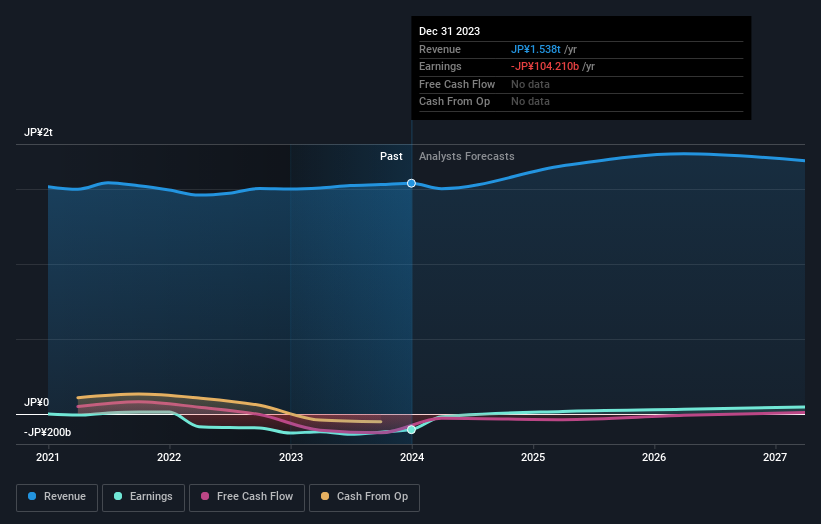Stock Analysis
Shareholders in Hino Motors (TSE:7205) have lost 54%, as stock drops 5.7% this past week

We think intelligent long term investing is the way to go. But that doesn't mean long term investors can avoid big losses. For example the Hino Motors, Ltd. (TSE:7205) share price dropped 56% over five years. That is extremely sub-optimal, to say the least. More recently, the share price has dropped a further 10% in a month. However, we note the price may have been impacted by the broader market, which is down 4.5% in the same time period.
After losing 5.7% this past week, it's worth investigating the company's fundamentals to see what we can infer from past performance.
Check out our latest analysis for Hino Motors
Hino Motors isn't currently profitable, so most analysts would look to revenue growth to get an idea of how fast the underlying business is growing. When a company doesn't make profits, we'd generally hope to see good revenue growth. That's because fast revenue growth can be easily extrapolated to forecast profits, often of considerable size.
Over half a decade Hino Motors reduced its trailing twelve month revenue by 6.4% for each year. That's not what investors generally want to see. With neither profit nor revenue growth, the loss of 9% per year doesn't really surprise us. We don't think anyone is rushing to buy this stock. Ultimately, it may be worth watching - should revenue pick up, the share price might follow.
You can see how earnings and revenue have changed over time in the image below (click on the chart to see the exact values).

Hino Motors is a well known stock, with plenty of analyst coverage, suggesting some visibility into future growth. If you are thinking of buying or selling Hino Motors stock, you should check out this free report showing analyst consensus estimates for future profits.
What About The Total Shareholder Return (TSR)?
Investors should note that there's a difference between Hino Motors' total shareholder return (TSR) and its share price change, which we've covered above. The TSR is a return calculation that accounts for the value of cash dividends (assuming that any dividend received was reinvested) and the calculated value of any discounted capital raisings and spin-offs. Dividends have been really beneficial for Hino Motors shareholders, and that cash payout explains why its total shareholder loss of 54%, over the last 5 years, isn't as bad as the share price return.
A Different Perspective
While the broader market gained around 31% in the last year, Hino Motors shareholders lost 14%. However, keep in mind that even the best stocks will sometimes underperform the market over a twelve month period. Unfortunately, longer term shareholders are suffering worse, given the loss of 9% doled out over the last five years. We'd need to see some sustained improvements in the key metrics before we could muster much enthusiasm. While it is well worth considering the different impacts that market conditions can have on the share price, there are other factors that are even more important. To that end, you should be aware of the 1 warning sign we've spotted with Hino Motors .
If you are like me, then you will not want to miss this free list of growing companies that insiders are buying.
Please note, the market returns quoted in this article reflect the market weighted average returns of stocks that currently trade on Japanese exchanges.
Valuation is complex, but we're helping make it simple.
Find out whether Hino Motors is potentially over or undervalued by checking out our comprehensive analysis, which includes fair value estimates, risks and warnings, dividends, insider transactions and financial health.
View the Free AnalysisHave feedback on this article? Concerned about the content? Get in touch with us directly. Alternatively, email editorial-team (at) simplywallst.com.
This article by Simply Wall St is general in nature. We provide commentary based on historical data and analyst forecasts only using an unbiased methodology and our articles are not intended to be financial advice. It does not constitute a recommendation to buy or sell any stock, and does not take account of your objectives, or your financial situation. We aim to bring you long-term focused analysis driven by fundamental data. Note that our analysis may not factor in the latest price-sensitive company announcements or qualitative material. Simply Wall St has no position in any stocks mentioned.
About TSE:7205
Hino Motors
Hino Motors, Ltd. manufactures and sells large commercial vehicles under the Hino brand worldwide.
Moderate growth potential and overvalued.

